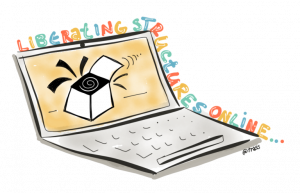Recently, the Liberating Structures (LS) user groups from Vancouver and Victoria B.C. got together ONLINE for the first time to experiment with LS online. As always, I love co-facilitating with my Victoria LS User Group partner, Beth Cougler Blom, and higher ed colleagues and Vancouver LS User group stewards Leva Lee and Barish Golland.
Post by Tracy Roberts, Senior Manager, Learning and Teaching

Our plan (see here for plan/details about HOW we did stuff, and here for slides) was to do Impromptu Networking, Troika, User Experience Fishbowl, and a bit of a share out from those of us who went to the LS Global Gathering in March. In 90 min, we ran out of time to do all, so we cut User Experience Fishbowl.
A few quick observations/takeaways:
- …Sigh…audio in particular, but technology generally continues to vex the online session. Having worked for 20 years in a field that does a LOT of online meetings, it annoys me that web conferencing technology still doesn’t just actually work. So yes, we still have to plan for it NOT to work: get people to show up early, create space to test audio, video, and drawing tools so people are ready to engage, have multiple facilitators to support all this.
- Have the invitation/discussion prompts visible at all times (slides, chat room, wherever works for the tool you are using).
- With Troika, we experimented with offering more/less structure and our participants preferred more, i.e., time each step using the timer tool + add text prompts to the timer to tell them what step they are on (vs. just giving them the full 8 minutes and adding a text chat to all telling them what step they should be on).
- Online CAN be better than f2f – e.g., you can quickly and completely control the return of small groups back to the main group! Online, it’s a click of a button and a few seconds and everyone is BACK, regardless if they were in the middle of a sentence. Not always so in-person!
- More is more. You need a facilitator, and 1-2 others to manage the technology (set timers, create breakout rooms, move people in and out of breakout rooms, monitor the chat, pop in and out of breakout rooms and generally troubleshoot on the fly). It’s important to be fast and available because with LS in play online, things are moving and, online, I think our patience can be thinner because it’s easier to feel MORE lost and frustrated than in a physical room where there are many more cues to help figure things out.
Learn more:
Join us for an upcoming Liberating Structures Workshop to discover how you can bring these effective strategies to the sessions you lead.
- November 7-8, 2019 – Liberating Structures
